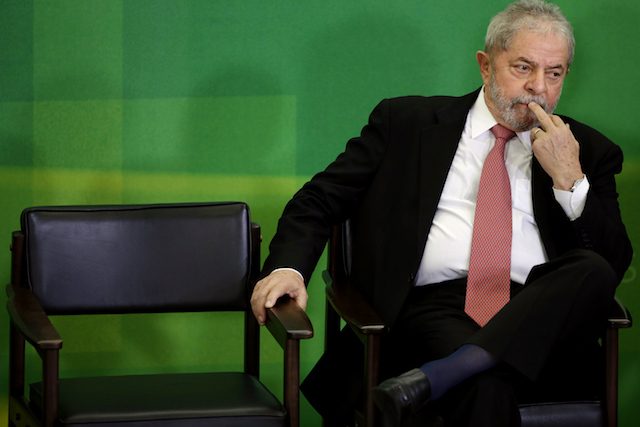SUMMARY
This is AI generated summarization, which may have errors. For context, always refer to the full article.

BRASÍLIA, Brazil (UPDATED) – Brazil’s chief prosecutor dealt a fresh blow Thursday, April 7 to President Dilma Rousseff and predecessor Luiz Inacio Lula da Silva, saying his cabinet appointment was an attempt to avoid arrest and disrupt investigations.
The latest twist in a roiling political saga comes as Rousseff faces impeachment proceedings in Congress over accusations of manipulating the government’s books to mask budget shortfalls during her 2014 re-election campaign.
Lula’s controversial appointment, which has been temporarily blocked by a Supreme Court judge, would give the former president ministerial immunity from trial in criminal court on separate charges related to a massive corruption scandal at state oil company Petrobras.
But Prosecutor General Rodrigo Janot, in a report filed with the court, recommended it annul the appointment. The full court must now rule whether Lula – a left-wing icon and founder of the ruling Workers’ Party – can take up the job.
“There is sufficient evidence to state that there was a deviation of purpose in the presidential decree” naming Lula as chief of staff, Janot said in the report, which will come as a blow to both Rousseff and ally Lula.
Lula is accused of accepting a luxury condo and a country home as bribes from construction companies caught up in the multi-billion-dollar graft scandal that has upended Brazilian politics.
Janot said Lula’s nomination was aimed at “disrupting the progress of the criminal investigations in the Car Wash case,” the name of the Petrobras probe.
It came hours after Rousseff called for a “grand pact” to unify the country.
“Brazil has already overcome difficult moments by making pacts,” she said in the capital Brasilia, promising to back “absolutely necessary political reforms” provided she were allowed to stay in power.
“That is the pact I’m looking for.”
Although the embattled president did not give any detail about what she was proposing, her comments appeared more conciliatory than in recent days, when she has repeatedly accused the opposition of mounting a coup attempt.
But Everaldo Moraes, a political scientist at the University of Brasilia, said Rousseff was grasping at straws.
“Rousseff feels her situation is worse every day. Impeachment is taking shape and it’s natural that she tries to raise the tone, but I think the moment of pacts as a way to seek support has passed,” he said.
Scandals mounting up
The rapporteur for a parliamentary commission on Wednesday found that Rousseff’s impeachment case – based on allegations that she illegally masked budgetary shortfalls in 2014 – should go ahead.
That initial finding will be followed by a vote in the full commission on Monday, April 11.
A week later, on April 18, the lower house of Congress will vote. A two-thirds majority there would send Rousseff to face an impeachment trial in the Senate, where another two-thirds vote would force her to step down.
Rousseff, who says her accounting tricks were common practice in previous governments and not an impeachable offense, is battling to assemble a coalition able to defeat the impeachment vote.
While the battle rages in Congress, another probe is under way at the country’s electoral court into allegations that Rousseff’s campaign was funded with money stolen in the Petrobras embezzlement scheme.
If the court finds Rousseff guilty on this, then her 2014 reelection victory would be annulled, meaning both she and her vice president, Michel Temer, would have to step down, followed by new elections.
Prosecutors say that for years under the Lula presidency a group of powerful companies and politicians conspired in a pay-to-play scheme where bribes were given to win inflated contracts.
Bribes went to executives at Petrobras and other state companies, influential politicians and also allegedly to political campaigns, including those of Rousseff and her narrowly defeated rival in 2014 Aecio Neves.
On Thursday, that scandal bubbled up again with the leaking of testimony from a former CEO who said his company had funneled bribe money into Rousseff’s reelection coffers. – Damian Wroclavsky, AFP/Rappler.com
Add a comment
How does this make you feel?
There are no comments yet. Add your comment to start the conversation.